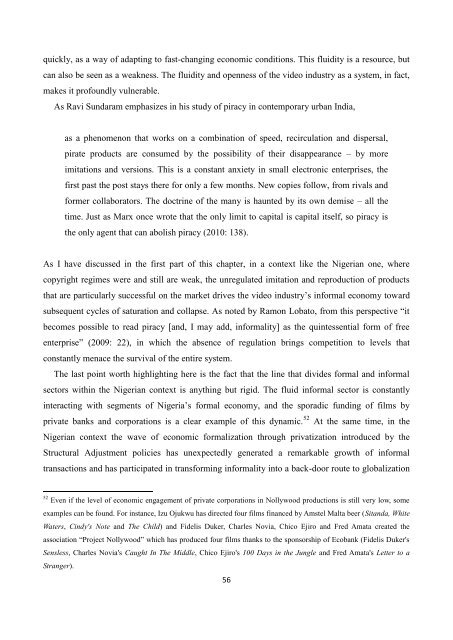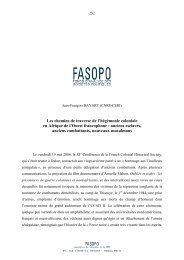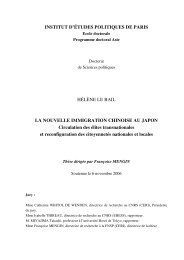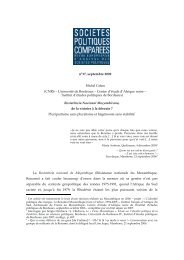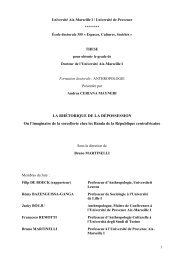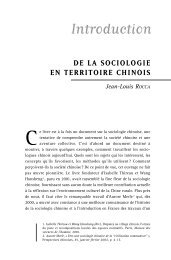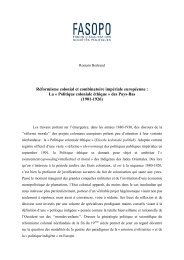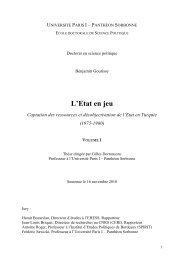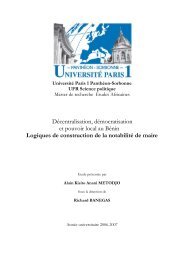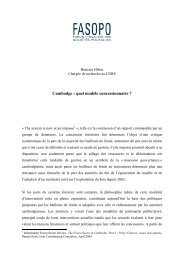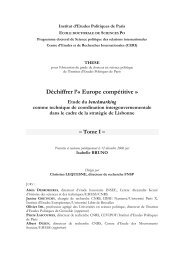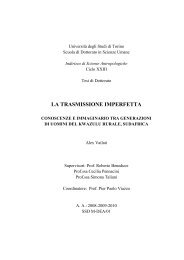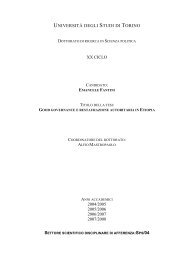- Page 2 and 3:
Università degli Studi di Napoli
- Page 4:
P. 169 CHAPTER VII. Nollywood abroa
- Page 8: owner or any of his friends. Once t
- Page 12 and 13: Nollywood. From this analysis it tr
- Page 14 and 15: phenomenon, affirming new aesthetic
- Page 16: CHAPTER IDefining the field of enqu
- Page 19 and 20: wave of young scholars interested i
- Page 21 and 22: “Small screen cinema”: The hist
- Page 23 and 24: villagers could assemble to watch
- Page 25 and 26: content to an audience disappointed
- Page 27 and 28: event that made the industry. While
- Page 29 and 30: Pentecostal churches’ Sunday serv
- Page 31 and 32: the essential heterogeneity, fluidi
- Page 33 and 34: ) The social life of thingsWhen con
- Page 35 and 36: the art or fashion market, is accel
- Page 37 and 38: QuestionsNollywood, as a phenomenon
- Page 39 and 40: Throughout the three sections that
- Page 41 and 42: who was shooting a video in those d
- Page 43 and 44: The Nigerian video industry has lon
- Page 45 and 46: CHAPTER IIRegulating mobility, resh
- Page 47 and 48: The production crisisWhen the video
- Page 49 and 50: distribution than the video format
- Page 51 and 52: As Jora emphasizes through a number
- Page 53 and 54: impact on the video industry’s ec
- Page 55: systems of rules that regulate the
- Page 59 and 60: distribution points for pirated goo
- Page 61 and 62: conducted by the numerous artists'
- Page 63 and 64: imperialism. In many cases the comb
- Page 65 and 66: Governor Fashola seems to be losing
- Page 67 and 68: CHAPTER III.From Nollywood to Nolly
- Page 69 and 70: on the contrary tended to reduce th
- Page 71 and 72: Emmanuel Isikaku, the president of
- Page 73 and 74: you now have two distinct formation
- Page 75 and 76: willingness to screen Nigerian film
- Page 77 and 78: Paths of formalization (II): The di
- Page 79 and 80: the United States and then in Ghana
- Page 81 and 82: etween the video-boom era and the n
- Page 83 and 84: will discuss further below, many of
- Page 85 and 86: Nollywood is normally consumed, sho
- Page 87 and 88: SECTION IITHE “NOLLYWOODIZATION
- Page 89 and 90: transnational reformulations of the
- Page 91 and 92: time, metaculture tends to develop
- Page 93 and 94: CHAPTER IVWhen the Nigerian video i
- Page 95 and 96: Haynes’ skepticism about “name
- Page 97 and 98: production about the phenomenon sta
- Page 99 and 100: epresent his national identity, bot
- Page 101 and 102: happened even if, as I will discuss
- Page 103 and 104: consciousness, but as the true, aut
- Page 105 and 106: is not. 84 This debate has often as
- Page 107 and 108:
the world in our home videos is all
- Page 109 and 110:
“Nollywood” and the Nigerian vi
- Page 111 and 112:
Nigerian productions in English, ar
- Page 113 and 114:
in terms of both the industrial inf
- Page 115 and 116:
it is possible to say that yet no N
- Page 117 and 118:
and on children selling snacks alon
- Page 119 and 120:
To give their films a plot, many do
- Page 121 and 122:
Within this context it might be imp
- Page 123 and 124:
epresent the industry are those tha
- Page 125 and 126:
What seems to be the major challeng
- Page 127 and 128:
Amongst the numerous festivals that
- Page 129 and 130:
ather documentarian orientation, as
- Page 131 and 132:
It is important to underline here t
- Page 133 and 134:
economic and social reality from wh
- Page 135:
The reaction that the international
- Page 138 and 139:
Marco Perugini, a sound and light t
- Page 140 and 141:
within Nollywood since the re-intro
- Page 142 and 143:
My intention in this chapter is to
- Page 144 and 145:
with foreign “White” media cont
- Page 146 and 147:
esemblance” ([1953] 1986: 32) bet
- Page 148 and 149:
The second problem relates to the s
- Page 150 and 151:
while the semantic approach has lit
- Page 152 and 153:
however, the structure of meaning t
- Page 154 and 155:
According to the same melodramatic
- Page 156 and 157:
develop widely accessible stories,
- Page 158 and 159:
condition, the Nigerian videos’ m
- Page 160 and 161:
dramatic item, but they allow them
- Page 162 and 163:
on the background, the sound of the
- Page 164 and 165:
profoundly condition the production
- Page 166 and 167:
“experienced in ‘reading’ and
- Page 168 and 169:
and stable moral constituency whose
- Page 170 and 171:
emergence of diasporic and migrant
- Page 172 and 173:
Migrant and diasporic filmmaking ha
- Page 174 and 175:
distribution, a position that he de
- Page 176 and 177:
Nollywood abroad: Defining the hist
- Page 178 and 179:
Immigrant Eyes (2010) and Amazing W
- Page 180 and 181:
the profits (image II). Furthermore
- Page 182 and 183:
while excluding others. To better d
- Page 184 and 185:
As I mentioned above the work of GV
- Page 186 and 187:
created by the language barrier, an
- Page 188 and 189:
arena in which in most of the cases
- Page 190 and 191:
Afrocentric images from and of the
- Page 192 and 193:
version of “Afrocentric” tradit
- Page 194 and 195:
CONCLUSIONVideos’ mobility and Ni
- Page 196 and 197:
New modes of operation emerged, and
- Page 198 and 199:
industry. This shift is provoking i
- Page 200 and 201:
authoring than our ideology and our
- Page 202 and 203:
the audience to interrogate the fil
- Page 204 and 205:
Toward a redefinition of Nigerian c
- Page 206 and 207:
FilmographyA Very Very Short Story
- Page 208 and 209:
L’industrie audiovisuelle au Ghan
- Page 210 and 211:
The Tenant. Dir. Onyekachi Ejim. Br
- Page 212 and 213:
Adesokan, Akin. 2004a. “How they
- Page 214 and 215:
Bazin, André. 1971. What is Cinema
- Page 216 and 217:
Eisenstadt, Shmuel N. 2000. “Mult
- Page 218 and 219:
---. 2007d. “Nnebue: The anatomy
- Page 220 and 221:
---. Forthcoming. “Karishika with
- Page 222 and 223:
---. 2005. “Social capital or ana
- Page 224 and 225:
Oduko, O.A. 1980. “Kung Fu tips t
- Page 226 and 227:
Punathambekar, Aswin. 2005. “Boll
- Page 228 and 229:
---. 2000. “Images of the reel th
- Page 230 and 231:
Aihe, Okoh. 1997. “Video: farewel
- Page 232 and 233:
Lasisi. Akeem. 2009. “Tinsel bene
- Page 234 and 235:
InterviewsAbulu, Tony (Nigerian dir
- Page 236:
Sandretti, Simone (Italian director


